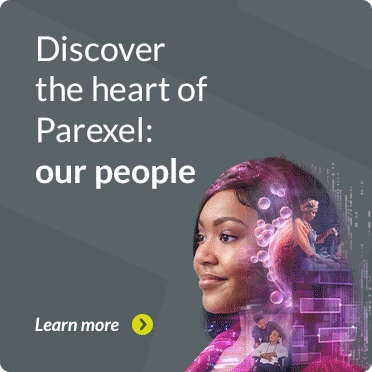Build a patient-friendly study, from beginning to end
Trial design has long focused solely on the science of the study while neglecting the practicalities of patient access and engagement. From difficulties finding out about study opportunities, to the challenges of visiting inconveniently located facilities for testing, there are many ways studies fall short in clinical trial recruitment, failing to engage and retain possible participants.
At Parexel, we’ve pioneered several clinical trial patient recruitment programs that reach and engage previously underrepresented populations, improve the trial experience for all participants, and yield better results for your trials. Our innovative recruitment strategies are designed to overcome common barriers, ensuring diverse, qualified patient populations are effectively recruited and retained throughout the study.
Ensuring full participation
To build better engagement strategies, we capture patient preferences, opinions, and voices on the study plan. We want to make sure the materials we provide resonate with them, so we have them review the study design to validate language, readability, and market message. With their insights, combined with our health literacy and inclusivity guidelines, we create accessible trial information for patients and their families that truly connects.
We also provide something we like to call compassionate closure to participants. In many studies, participants come in for their last visit, then never hear from the study again — feeling abandoned after having built relationships with the staff and gotten invested in the study outcome. So we thank them for their contributions, and keep them informed on the results of the study.
Patient inclusion
Incorporating diversity of race, ethnicity, gender identity, socioeconomic status, and disability into our studies is a core part of how we do business. It’s part of our patients-first approach. Rather than waiting for problems to arise, we proactively recruit with diversity in mind and factor diversity into our RFPs and bid defenses.
Support from our patient-focused groups
To further improve the experience of patients business wide, we also run patient-focused groups. These include patient ambassadors, a patient partnership group that manages relationships with advocacy groups, and a global Patient Advisory Council that consists of patients and carers with various diseases and real-life experiences who provide feedback on any proposed tool or service. Their insights help us keep all our processes and protocols truly focused on the patients’ needs.
Our Experts
Browse our latest insights
Want to hear from our experts on the latest industry topics? Visit our Insights Center to read, watch, and listen.
Frequently asked questions
Clinical trial patient recruitment is a critical process in the field of medical research and drug development. It involves finding, screening, and enrolling suitable participants for clinical studies.
Recruiting patients for a clinical trial involves a multi-faceted approach that combines strategic planning, outreach, and careful screening. The process typically begins with defining the target patient population based on the study's inclusion and exclusion criteria. Researchers then employ various methods to reach potential participants, including leveraging physician referrals, utilizing patient databases, and implementing targeted advertising campaigns through print, digital, and social media channels. Community outreach programs, partnerships with patient advocacy groups, and the use of online clinical trial matching services can also be effective in identifying eligible candidates. It's crucial to provide clear, accessible information about the trial, its potential benefits, and risks to help potential participants make informed decisions.
Patient recruitment is crucial in clinical trials because it directly impacts the success, validity, and timeliness of the research. Adequate recruitment ensures that trials have sufficient statistical power to draw meaningful conclusions about the safety and efficacy of new treatments, drugs, or medical devices. Without enough participants, studies may fail to detect significant effects or may produce inconclusive results, potentially delaying or preventing the development of life-saving treatments. Proper recruitment also helps to ensure diversity in the study population, which is essential for understanding how treatments may affect different demographic groups. Furthermore, efficient recruitment can reduce the overall duration and cost of clinical trials, accelerating the process of bringing new therapies to market. Ultimately, successful patient recruitment is fundamental to advancing medical knowledge, improving patient care, and developing innovative treatments that can benefit public health on a global scale.
Clinical trial patient recruitment faces several common challenges that can significantly impact the success and timeline of studies. One major hurdle is finding enough eligible participants who meet the specific inclusion criteria, especially for rare diseases or conditions with strict eligibility requirements. Public misconceptions and fears about clinical trials often deter potential participants, necessitating extensive education and outreach efforts. Competing trials targeting the same patient population can create a scarcity of eligible candidates. Ensuring diversity and representation in study populations is another significant challenge, as certain demographic groups may be historically underrepresented or harder to reach. Regulatory and ethical considerations, such as obtaining informed consent and protecting patient privacy, add complexity to the recruitment process. Additionally, retention of participants throughout the trial duration can be difficult due to factors like lengthy study periods, demanding protocols, or side effects of experimental treatments. Lastly, the high costs associated with recruitment efforts, including advertising and screening processes, pose financial challenges for many trials. Overcoming these obstacles requires innovative strategies, effective communication, and a patient-centric approach to recruitment and retention.






